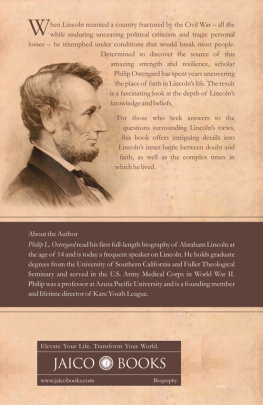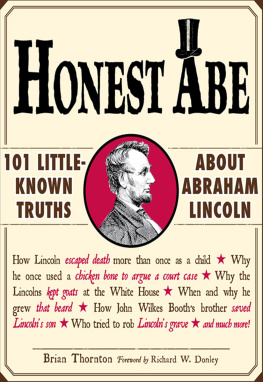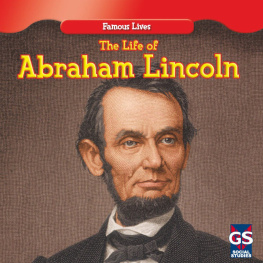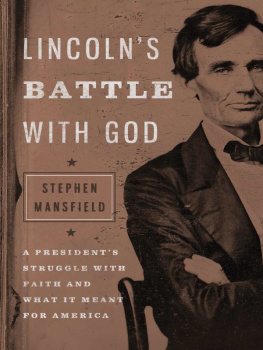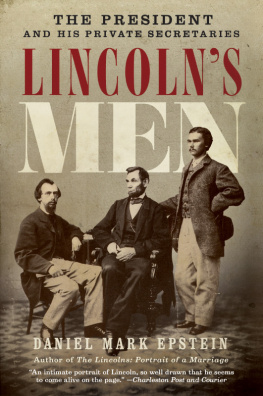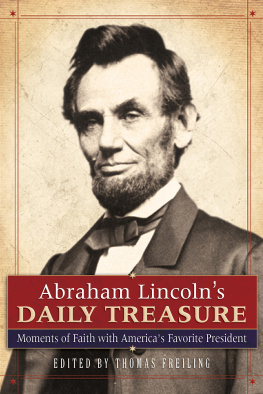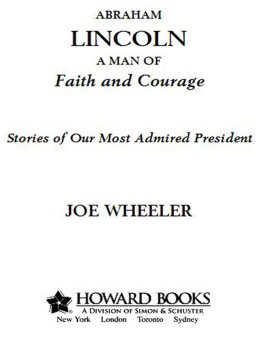ABRAHAM
LINCOLN
______________________
The Inspirational Wisdom of
Abraham Lincoln
PHILIP L. OSTERGARD
JAICOPUBLISHING HOUSE
Ahmedabad Bangalore Bhopal Bhubaneswar Chennai
Delhi Hyderabad Kolkata Lucknow Mumbai

ABRAHAM LINCOLN'S
OWN STORY
December 20, 1859
To Jesse W. Fell, Enclosing Autobiography
I was born Feb. 12, 1809, in Hardin County, Kentucky. My parents were both born in Virginia, of undistinguished familiessecond families, perhaps I should say. My mother, who died in my tenth year, was of a family of the name of Hanks, some of whom now reside in Adams, and others in Macon counties, Illinois.
CW III: 511
Much about life for a boy growing up two hundred years ago in the secluded Indiana wilderness is lost to us in the shadows of time long past.
Shortly before he became president, Lincoln himself filled in some of the broad details of his family and early life. By then, he had become nationally known as a result of the Lincoln-Douglas Debates, during which Lincoln had squared off against Stephen Douglas for the Illinois Senate seat. Lincoln's friend Jesse Fell, whom he'd known since his first term in the Illinois legislature twenty-five years before, had asked him to write a brief account of his life that Fell and other Lincoln supporters could use to advance his nomination for the presidency. Though Lincoln was reluctant to do so at first, eventually he wrote a brief autobiography.
My paternal grandfather, Abraham Lincoln, emigrated from Rockingham County, Virginia, to Kentucky, about 1781 or 2, where, a year or two later, he was killed by indians, not in battle, but by stealth, when [where?] he was laboring to open a farm in the forest. His ancestors, who were (Quakers, went to Virginia from Berks County, Pennsylvania. An effort to identify them with the New-England family of the same name ended in nothing more definite, than a similarity of Christian names in both families, such as Enoch, Levi, Mordecai, Solomon, Abraham, and the like. My fathe r, at the death of his fathe r, was but six years of age; and he grew up, litterally without education....
CW III: 511
This first Abraham Lincoln had been a moderately wealthy Virginia landowner who felt the urge to follow a distant relative, Daniel Boone, over the Cumberland Mountains into Kentucky. While he was clearing a parcel of landand while his three sons watcheda bullet shot by a Native American ended his life. One warrior ran to snatch Thomas, Abraham's six-year-old son, who was sobbing over his dead father, with the intent of carrying him into the wilderness. Fortunately, another son, Josiah, quickly reacted with an accurate rifle shot, and the future president's father was unharmed.
At age twenty-eight, Thomas married Nancy Hanks Lincoln. Though Lincoln's father has sometimes been described as shiftless, records show that he was respected as an honest and honorable person, a carpenter by trade. At the time of their first son's birth, Thomas and Nancy lived on a farm on the South Fork of Nolin Creek with their daughter, Sarah. There Thomas had built the log cabin in which the future president was born. Two years later, Thomas bought and then moved the family to another farm on Knob Creek.
Incomplete surveying and unregulated legal records caused Thomas problems in Kentucky. Furthermore, he detested slavery, which was legal in that state. So Thomas moved his family again, this time across the Ohio River into Indiana. Not long after, his wife died of milk sickness, an often fatal disease contracted by drinking milk from a cow that had eaten white snakeroot. Thomas was left to raise their two children alone.
... He [Thomas Lincoln] removed from Kentucky to what is now Spencer County, Indiana, in my eighth year. We reached our new home about the time the State came into the Union. It was a wild region, with many bears and other wild animals still in the woods. There I grew up.
CW III: 511
Not long after the death of Nancy Hanks Lincoln, Abraham and his sister, Sarah, were left alone with their cousin Dennis Hanks for weeks as Thomas sought a new wife. He chose wisely, and Sarah Bush Johnston became Abraham's stepmother in 1819. When she arrived at the Lincoln home with her own three children, she was appalled by the conditions in which her two stepchildren were living. It is clear that she made their house a home again and that Abraham was always fond of her.
There were some schools, so called; but no qualification was ever required of a teacher, beyond "readin, writin, and cipherin," to the Rule of Three. If a straggler supposed to understand latin, happened to so-journ in the neighborhood, he was looked upon as a wizzard. There was absolutely nothing to excite ambition for education. Of course when I came of age I did not know much. Still somehow, I could read, write, and cipher to the Rule of Three; but that was all. I have not been to school since. The little advance I now have upon this store of education, I have picked up from time to time under the pressure of necessity....
CW III: 511
All told, Lincoln probably received only a few months of formal education. Yet he was an insatiable learner. He had access to few books but devoured those he was able to borrow, including Robinson Crusoe, The Pilgrim's Progress, and Aesop's Fables. His great love for America was inspired, in part, by reading Weems's Life of Washington and Grimshaw's History of the United States.

In 1819 the Rev. Louis A. Warren was a minister in Hodgenville, Kentucky, where Abe Lincoln was born. People wrote him asking for information about Lincoln's boyhood, inciting his interest to the extent that he pursued a lifetime of research and writing about the parentage and childhood of our sixteenth president. His books offer extensive information about wilderness life, yet specific details regarding Abe's childhood and young manhood are sparse.
Still, it is obvious that Lincoln had to overcome unimaginable disadvantages to become president. Yet what we call disadvantages might in some ways have been advantages. In our minds, we see the dirt floor and feel the cold biting wind, marveling that Abe Lincoln could ever have climbed the ladder to success. The frontier with its exposure to the elements was an efficient though harsh teacher with important lessons.
The boy Abe drew his first gulps of water from a natural spring. The young child had been rocked to sleep in the quietness of the wilderness night, with the sound of the hoot of an owl or the mating call of a lynx. Through life, many would assert that he knew no fear. As president, surrounded by arguing, unreasonable congressmen, smeared by newspaper editors, and nagged by a well-meaning wife, he would draw his clear thinking from the wisdom of the wilderness.
The hardships of the frontier disciplined its pupils into developing two great, though seemingly opposite, traits. The pioneer had to be self-reliant and, at the same time, he or she had to work with and rely upon others. We will see that these two characteristics blend beautifully. As a president presiding over a cabinet, Lincoln displayed both traits. He was unmovable in his basic decisions, and at the same time, he relied upon and elicited the best efforts of every man.

